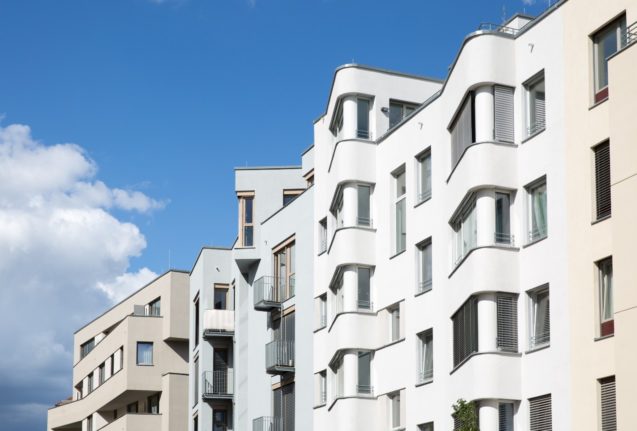INTERVIEW: 'Germany needs to become more attractive for immigrants'

Germany is desperate for skilled workers - but foreigners still face huge hurdles if they want to come to the country and work. We spoke to Misbah Khan, a Green MP working on reforming the country's visa system, to find out how the government wants to change all that.
Things are moving at a rare pace in Germany - at least as far as immigration is concerned. As the government finalises its draft of its upcoming citizenship law, it is also preparing for a sweeping reform of its working visa system, with hopes that both bills will pass by summer.
If they do, skilled workers will soon be able to come to Germany much more easily - even if they don't have a job offer already lined up.
According to Greens MP Misbah Khan, the feverish pace is matched by the urgency of the situation, particularly in Germany's under-staffed labour market.
READ ALSO: KEY POINTS: What's in Germany's new draft law on skilled immigration?
"The labour shortage we have in Germany is steadily worsening and it's already hampering the green transformation we have," Khan told The Local's Germany in Focus podcast. "We have problems in progress with our health care, with our care (system), with construction, with craft, with IT - so in almost all industries, there's a shortage and it's hard to support the economy."
Boston Consulting estimates that this dearth of skilled workers is costing the German economy €86 billion yearly - and Khan says the problem is not just hampering prosperity, but also the country's social system.
So why is Europe's largest economy struggling to attract new migrants?
Khan believes the problem starts with a convoluted immigration system - and years of policies designed to deter migration.
LISTEN: BONUS EPISODE: Why Germany is overhauling immigration laws
"The fact is that the huge labour shortage we have today is due to the restrictive migration policies that the CDU and CSU had been pursuing for the last 16 years," she explained. "And now we are in a situation where we need quick and simple solutions."
The first of these "quick" solutions, Khan says, is a reform of the immigration system so that people with professional experience or qualifications can enter the country more easily.
"We want to make it easier to get a qualification or to work while getting a qualification," she says. "We'll take practical work experience into account, which we didn't do before, and we will have a hopefully easy-to-understand points system that will make it easier to get a residence permit for job-seeking."
'Overly bureaucratic'
Under Germany's plans for a new points-based Chancenkarte, people can potentially net enough points to come to the country without speaking a word of German - as long as they have at least C1 English skills. This is another way that the country hopes to become more competitive and attractive for international workers.
"It is a plus if you speak German, or if you want to speak German, to come and look for a job, but I think it's more important to not have that as a requirement because the modern world might not need somebody who speaks German," says Khan. "It might be more helpful if somebody speaks English. So if your English is good or your German is not perfect, the points system works."
READ ALSO: ‘More jobs in English’: How Germany could attract international workers

Green MP Misbah Khan, who is currently working on the immigration reforms.
Nevertheless, the Green MP recognises that the problems won't end with a points-based system, looser immigration rules or a new type of visa. Instead, Germany will need to "change a lot" over the coming months - not just within its immigration system but in its bureaucracy and attitude to migrants.
The visa system is "overly bureaucratic" and "inefficient in its procedures", she says, which can be off-putting to migrants - especially when the authorities are overwhelmed by paperwork and unable to offer quick appointments.
"Bureaucratic steps can be optimised and have to be improved," Khan explains. "This is where I see the greatest potential to reduce the workload in these migration authorities. This is something we will tackle as well."
'We have to do more'
However, encouraging migration goes beyond simply the process of applying for a visa: people also make key decisions based on the quality of life a country can offer them.
That's why the government is also considering other aspects of life in Germany that can affect both immigrants and locals alike.
"I really hope that this immigration bill helps, but the bill alone won't change society," Khan said. "So we do have to do more than that. We have to have a positive, welcoming culture and we have to work on actively supporting the environment for families, having sufficient daycare places and housing and being unbureaucratic in digital administration and offering a modern citizenship law."

Blocks of flats in the German capital of Berlin. Photo: picture alliance/dpa | Florian Schuh
READ ALSO: Could bureaucracy trip up Germany's planned points-based visa system?
In short, the drive to encourage more skilled immigration starts with making Germany an even better place to live.
"Whatever makes us more attractive as a country for people to invest in us long-term is something we want to focus on," Khan explains. "We need to become more attractive for immigrants."
One thing the government has far less control over, of course, is cultural attitudes. With some internationals reporting that they feel unwelcome in the country, this will be another barrier to break down.
But for Khan, the message for future migrants is clear: "We want you to stay," she says. "We want you to feel welcome here. And that is something we see as an element part of a genuine welcoming culture."
Comments (1)
See Also
Things are moving at a rare pace in Germany - at least as far as immigration is concerned. As the government finalises its draft of its upcoming citizenship law, it is also preparing for a sweeping reform of its working visa system, with hopes that both bills will pass by summer.
If they do, skilled workers will soon be able to come to Germany much more easily - even if they don't have a job offer already lined up.
According to Greens MP Misbah Khan, the feverish pace is matched by the urgency of the situation, particularly in Germany's under-staffed labour market.
READ ALSO: KEY POINTS: What's in Germany's new draft law on skilled immigration?
"The labour shortage we have in Germany is steadily worsening and it's already hampering the green transformation we have," Khan told The Local's Germany in Focus podcast. "We have problems in progress with our health care, with our care (system), with construction, with craft, with IT - so in almost all industries, there's a shortage and it's hard to support the economy."
Boston Consulting estimates that this dearth of skilled workers is costing the German economy €86 billion yearly - and Khan says the problem is not just hampering prosperity, but also the country's social system.
So why is Europe's largest economy struggling to attract new migrants?
Khan believes the problem starts with a convoluted immigration system - and years of policies designed to deter migration.
LISTEN: BONUS EPISODE: Why Germany is overhauling immigration laws
"The fact is that the huge labour shortage we have today is due to the restrictive migration policies that the CDU and CSU had been pursuing for the last 16 years," she explained. "And now we are in a situation where we need quick and simple solutions."
The first of these "quick" solutions, Khan says, is a reform of the immigration system so that people with professional experience or qualifications can enter the country more easily.
"We want to make it easier to get a qualification or to work while getting a qualification," she says. "We'll take practical work experience into account, which we didn't do before, and we will have a hopefully easy-to-understand points system that will make it easier to get a residence permit for job-seeking."
'Overly bureaucratic'
Under Germany's plans for a new points-based Chancenkarte, people can potentially net enough points to come to the country without speaking a word of German - as long as they have at least C1 English skills. This is another way that the country hopes to become more competitive and attractive for international workers.
"It is a plus if you speak German, or if you want to speak German, to come and look for a job, but I think it's more important to not have that as a requirement because the modern world might not need somebody who speaks German," says Khan. "It might be more helpful if somebody speaks English. So if your English is good or your German is not perfect, the points system works."
READ ALSO: ‘More jobs in English’: How Germany could attract international workers

Nevertheless, the Green MP recognises that the problems won't end with a points-based system, looser immigration rules or a new type of visa. Instead, Germany will need to "change a lot" over the coming months - not just within its immigration system but in its bureaucracy and attitude to migrants.
The visa system is "overly bureaucratic" and "inefficient in its procedures", she says, which can be off-putting to migrants - especially when the authorities are overwhelmed by paperwork and unable to offer quick appointments.
"Bureaucratic steps can be optimised and have to be improved," Khan explains. "This is where I see the greatest potential to reduce the workload in these migration authorities. This is something we will tackle as well."
'We have to do more'
However, encouraging migration goes beyond simply the process of applying for a visa: people also make key decisions based on the quality of life a country can offer them.
That's why the government is also considering other aspects of life in Germany that can affect both immigrants and locals alike.
"I really hope that this immigration bill helps, but the bill alone won't change society," Khan said. "So we do have to do more than that. We have to have a positive, welcoming culture and we have to work on actively supporting the environment for families, having sufficient daycare places and housing and being unbureaucratic in digital administration and offering a modern citizenship law."

READ ALSO: Could bureaucracy trip up Germany's planned points-based visa system?
In short, the drive to encourage more skilled immigration starts with making Germany an even better place to live.
"Whatever makes us more attractive as a country for people to invest in us long-term is something we want to focus on," Khan explains. "We need to become more attractive for immigrants."
One thing the government has far less control over, of course, is cultural attitudes. With some internationals reporting that they feel unwelcome in the country, this will be another barrier to break down.
But for Khan, the message for future migrants is clear: "We want you to stay," she says. "We want you to feel welcome here. And that is something we see as an element part of a genuine welcoming culture."
Join the conversation in our comments section below. Share your own views and experience and if you have a question or suggestion for our journalists then email us at [email protected].
Please keep comments civil, constructive and on topic – and make sure to read our terms of use before getting involved.
Please log in here to leave a comment.